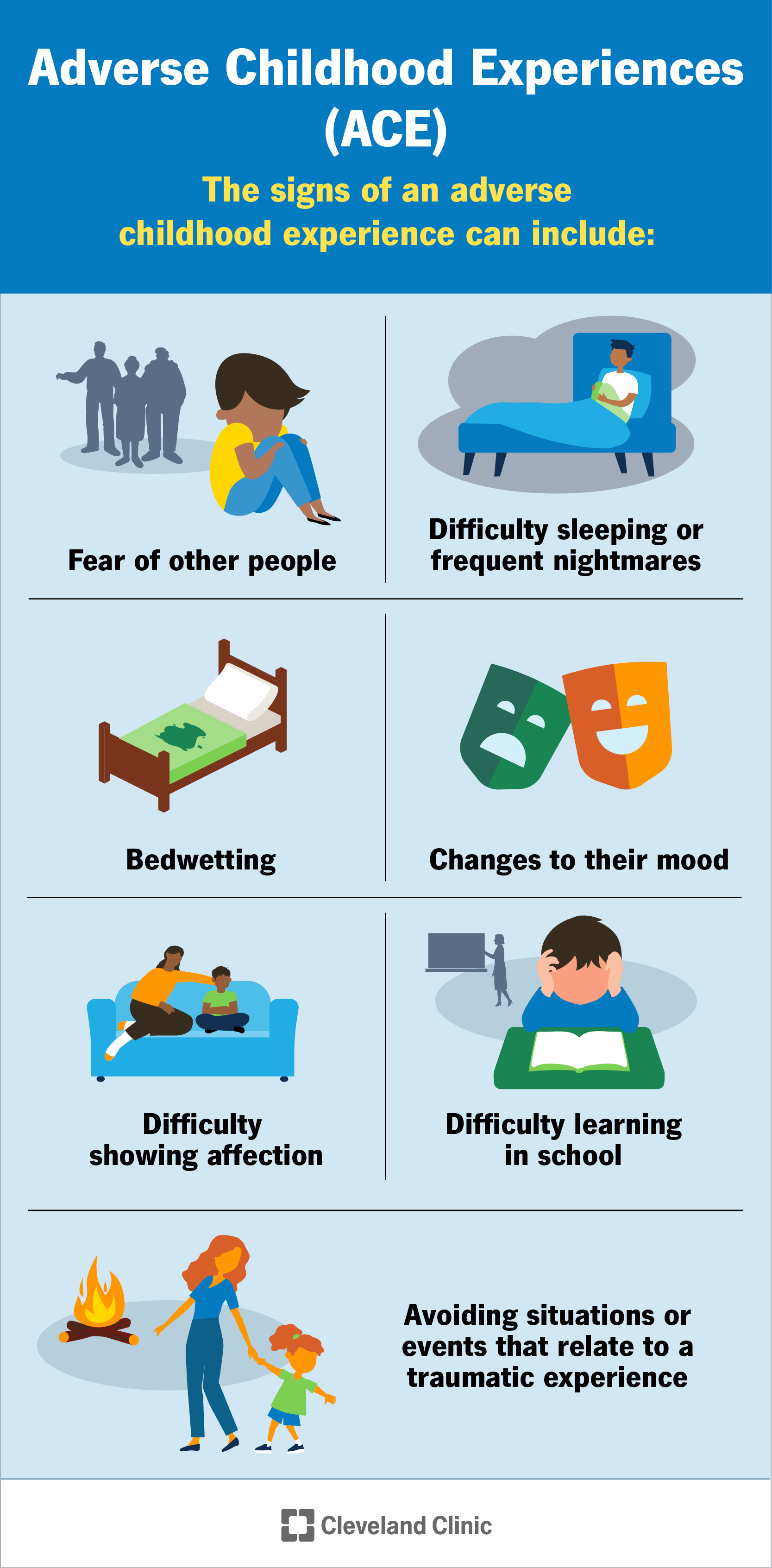Adverse childhood experiences (ACEs) can have a lasting impact on your health and well-being. The negative experiences of childhood trauma can affect your growth and development. They can lead to physical, mental and behavioral health problems. ACEs can also decrease your life expectancy. But with treatment, you can still lead a fulfilling life.
Advertisement
Cleveland Clinic is a non-profit academic medical center. Advertising on our site helps support our mission. We do not endorse non-Cleveland Clinic products or services. Policy

Image content: This image is available to view online.
View image online (https://my.clevelandclinic.org/-/scassets/images/org/health/articles/24875-adverse-childhood-experiences)
Adverse childhood experiences (ACEs) are traumatic events that happen between birth and the age of 17. ACEs can cause childhood trauma that lingers long after the event occurred.
Advertisement
Cleveland Clinic is a non-profit academic medical center. Advertising on our site helps support our mission. We do not endorse non-Cleveland Clinic products or services. Policy
ACEs can take a toll on your body and mind. You may have physical, mental or behavioral health challenges. But with time, you can heal. Treatment can help you put your childhood trauma behind you.
Examples of adverse childhood experiences include:
Life-threatening illness
Social drivers of health may also cause childhood trauma. These are environmental factors that can lead to adverse childhood experiences with a lasting impact. These factors may include:
Any child can experience trauma, but certain factors raise the risk. ACEs are more common among:
Advertisement
Childhood trauma causes extreme stress on your body. When you experience stress, your body releases certain hormones, like cortisol and adrenaline. These hormones help you adjust to the situation. This is called the “fight-or-flight” response. You may have:
This response is usually temporary. But long-term stress causes your stress hormones to be in constant use. This is called toxic stress. It can target your brain and change how it grows and functions.
Adverse childhood experiences can cause developmental trauma. While traumatic events can cause harm at any age, childhood trauma is more severe. That’s because a child’s brain is still growing and developing. ACEs target a child’s:
Severe or long-term stress places these parts of a child’s brain into survival mode for too long. This can weaken those parts. That, in turn, influences the way children react to certain situations as they grow older.
After an adverse childhood experience, a child may show signs of trauma that could include:
These signs might not be immediately present after a traumatic event. They usually develop after a child has had time to process the experience. In certain cases, a trigger — something that reminds a person of a specific event — can cause a child to react.
ACEs can affect an adult years after traumatic events occurred. It can impact your physical, mental and behavioral health. Childhood trauma can also affect your quality of life. Access to opportunities, like your career and education, may see an impact.
The effects of adverse childhood experiences in adulthood can include long-term (chronic) conditions. This happens because too much stress takes a toll on your body. It affects the way your cells divide and replicate. This can result in cancer. It also affects the way your heart functions by increasing your blood pressure. This can lead to heart disease.
ACEs can also decrease your overall life expectancy by nearly 20 years compared to someone who doesn’t have any ACEs.
Advertisement
Mental health conditions that can develop in adulthood include:
Childhood trauma makes adults more likely to participate in high-risk behaviors, including:
If you or a loved one is considering suicide, you can call the 988 Suicide & Crisis Lifeline.
An ACE score is the total number of adverse childhood experiences you faced growing up. The ACEs test asks you 10 questions about traumatic events that may have happened during your childhood. The purpose of the ACEs test is to quickly figure out if you’re at a high risk for toxic stress. If you are, your healthcare provider will ask further questions about your specific ACEs and start childhood trauma treatment.
Research suggests that a high ACE score is directly linked to negative health and wellness in adulthood. Adults with 4 or more ACEs were 12 times more likely to develop conditions, including:
Advertisement
Healthcare providers figure out your ACEs score by asking you about 10 potential adverse childhood experiences. If you faced any of them during childhood, they’ll give you 1 point. The 10 ACEs of childhood trauma are:
Healing from childhood trauma takes time — but it’s possible. Self-care, support and therapy can make a big difference. Treatment for the effects of childhood trauma may start with steps to reduce your stress. Your healthcare provider may suggest:
Advertisement
Your provider may recommend further mental health care, including:
A child is constantly learning from the world around them. So, traumatic events may have a major effect on their growth and development. Adverse childhood experiences (ACEs) are common. With help from a healthcare provider, you can heal from your childhood trauma. Treatment may be lifelong, but you can overcome your ACEs. It’s important to take care of your mental health. Remember, you’re never alone.

Sign up for our Health Essentials emails for expert guidance on nutrition, fitness, sleep, skin care and more.
Learn more about the Health Library and our editorial process.
Cleveland Clinic’s health articles are based on evidence-backed information and review by medical professionals to ensure accuracy, reliability and up-to-date clinical standards.
Cleveland Clinic’s health articles are based on evidence-backed information and review by medical professionals to ensure accuracy, reliability and up-to-date clinical standards.
As your child grows, you need healthcare providers by your side to guide you through each step. Cleveland Clinic Children’s is there with care you can trust.
